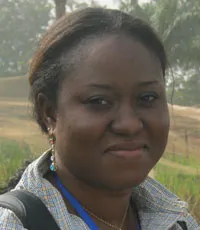Last week, a judge in Senegal convicted a man of assaulting three journalists outside their newspaper’s office in the capital Dakar last month. The attack was not related to journalism, but the quick arrest and prosecution of the perpetrator serves as an instructive contrast between the handling of an ordinary crime and the handling of abuses against journalists in the line of duty – cases which are usually politicized, stalled, or both.
Lalla Cissokho, Ndeye Awa Lo, and Oumy Diakhaté, three female reporters at private daily Walf Grand’Place, were assaulted by a man wielding a belt on February 17, the same day several reporters came under attack while covering violent clashes between security forces and demonstrators protesting President Abdoulaye Wade’s bid for a third term in office. Having covered the day’s events unscathed, the trio left their newspaper’s office around 11 p.m. local time to get something to eat before heading home. While awaiting their order, Lo made a comment about a broken-down car that 23-year-old Pape Samba Ndiaye was pushing on the wrong side of the road with his uncle at the wheel. “I heard one of them insult me and I went towards them,” the Senegalese press agency quoted Ndiaye as telling the judge during the March 9 hearing. “It was when one of them had wanted to intervene between me and the other lady I was arguing with that I removed my belt to beat her.”
The judge sentenced Ndiaye to 15 days of imprisonment for inflicting several injuries on Cissokho and Lo, the media reported. Cissokho — who sustained bruises to the lip, left eye, and left shoulder from multiple hits by the metal buckle of Ndiaye’s belt — told CPJ she was still recovering from the shock. “Since then I don’t go out at night because of the fear,” she said. Lo was also bruised on her back and shoulder. “It happened Friday night. We first went to the hospital for treatment and immediately reported the incident to the police on Saturday. But they did not act,” she said. “It was when we got a lawyer that the man was arrested on Tuesday.”
Ndiaye was arrested on February 21. Due to the courts not sitting during the period of the presidential election, he remained in detention for two weeks until March 5, when his case came up in court. It was then adjourned until March 9, when the court gave its judgement. “No one should take the laws into one’s hands even if you are insulted,” said the counsel to the journalists, Ndéné Ndiaye, according to Agence de Presse Senegalaise. The judge, however, released the convicted assailant the same day on the basis that the two weeks of pretrial detention were tantamount to the 15-day sentence passed on him.
For Aissatou Kane, the president of the Senegalese association of young journalists, the verdict in the case is “laughable” in light of the high number of journalists still seeking justice for abuse at the hands of officials, public figures, and security forces. Judgments in favor of the press “are very few,” Kane told CPJ. “I can count them on the fingers of one hand.” The Senegalese justice system has being “dragging its feet” in several cases of journalists assaulted, threatened, and intimidated over the years in retaliation for their work, she said.
CPJ documented at least a dozen cases of physical or verbal intimidation of journalists reporting on Senegal’s election campaign and February 26 vote, most of them involving security forces and members of the ruling Democratic Party of Senegal (PDS), but there have been no arrests since, according to local journalists. Furthermore, in at least three other high-profile cases going back to 2008, CPJ found evidence of executive political interference in the judiciary to shield security forces and prominent figures of the regime from being held to account.
